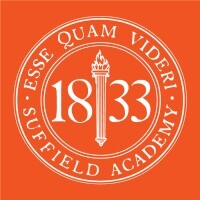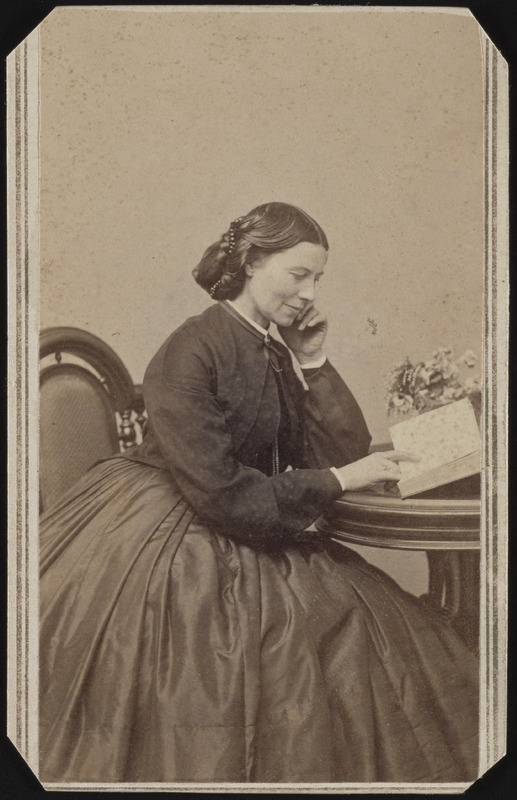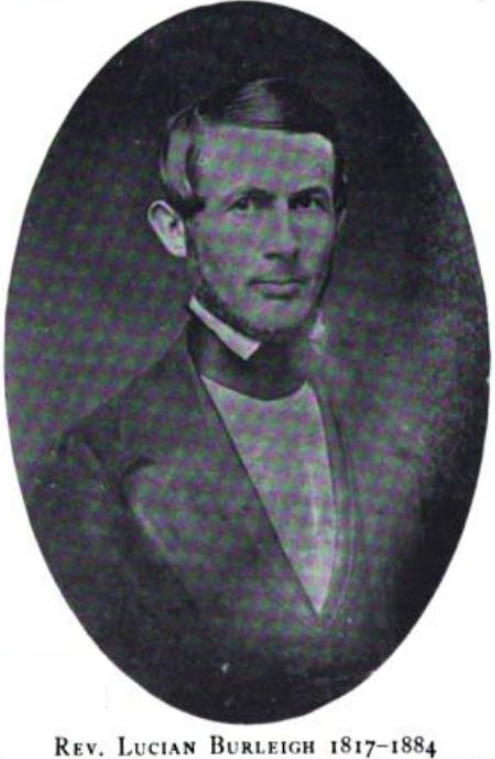Lucian Rinaldo Burleigh: Preacher and Teacher
I. Enigmatically Conventional: Lucian Rinaldo Burleigh's Storyline
There is a slippery quality to the life history of the fifth of the core siblings. Lucian can be described as conventional - he stays near home most of his life, is a farmer, a Baptist exhorter, and a temperance advocate. Yet he also had genuine Abolitionist credentials, a brief moment of romance (?) with Clara Barton, served as an officer of the Christian Union conference of 1840, and married into the Child family through his wife Elizabeth Morse Child, connecting him thus to David Lee Child and Lydia Maria Child. He is mistakenly listed as the author of his brother George's poem "Descent from the Cross" because Lucian was the person who read it aloud (in the language of the time, he "delivered" it).
At the present moment. no letters from his later life have been uncovered, meaning his personal life and relationships with his parents, siblings, wife, and children are nearly impossible to discern. He and Elizabeth had six children. Their most significant progeny was the father's namesake son, lithographer L.R. Burleigh, but all six of the children lived to adulthood, and five had children of their own, making the descendants of Lucian one of the most prodigious lines.
He started his professional life as a teacher, before going back to Plainfield - presumably to assist his sister Mary with elder care for their parents - and taking up farming full time. He combined his two professional identities in a valiant, though ultimately unsuccessful attempt to resuscitate the Plainfield Academy, which had fallen on hard times. He also made a trip to Wisconsin to boost a moral reform cause about the suppression of vice (code for anti-prostitution).
As with his sister Mary, it is obvious that once his parents were deceased, Lucian could take on new missions in life. This is when he became an agent for the Connecticut Temperance Union, and was ordained as an evangelist by Packerville Baptist Church - the same church associated with Prudence Crandall and the Canterbury Female Academy. His contributions to the histories of Packerville Baptist and the Plainfield Academy are excellent primary sources for understanding the pre-Civil War decades in Windham county.
II. Schooling and Teaching - the Early Years of Lucian Rinaldo Burleigh
Lucian Burleigh was a student at the Plainfield Academy, and later at the fledgling Suffield Academy. He followed in some of his older brothers' footsteps by teaching at Killingly, Connecticut and Oxford, Massachusetts (both places where John had preceded him), and much later at his own alma matars of Plainfield and Suffield.
He had an intense epistolary episode with the famed Clara Barton when they were both young. They met when Lucian was teaching in Oxford, which was also when he had his formal conversion to the Baptist faith. To do so meant that he had been "born again in the Spirit" - an intense religious experience well-calculated to impress the mind of a (then) eighteen-year old. In a letter, he fervently wishes for Clara to have the same sort of experience.
Another important pro-feminist moment came in 1840, when he wrote to Maria Weston Chapman, asking her if the Boston Female Anti-Slavery Society could spare one of its gratis subscriptions to The Liberator for the still-young Suffield Academy library, where the newly-hired Lucian was intending to grow the Abolitionist presence on campus. The idea of this young man - albeit one with a storied family connection - would be beseeching a woman and a woman-led organization to assist him, says a lot about the gender dimensions of Garrisonian Immediate Abolition at the time of the famous schism.
More to come!
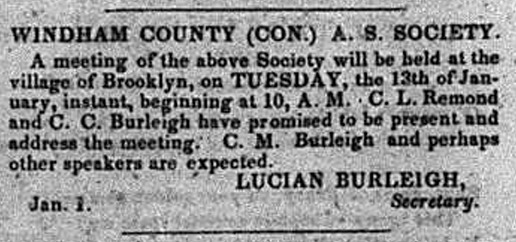
The Liberator, 1846-01-09 16:2:7
III. Middle Age, Marriage, and the Farm
When Lucian returned to Plainfield in the early 1840s (precise date to be determined as evidence appears), he undertook an important anti-slavery role, serving as the secretary to the Windham County Anti-Slavery Society. This time coincided with the editorship of The Charter Oak in Hartford by his brother William (later assisted by George). Thus, Windham county notices were received and published with alacrity and attention.
The meeting highlighted in the Liberator announcement shown here featured three of the brothers - Lucian, Charles and Cyrus - along with African-American Garrisonian Abolitionist Charles Lenox Remond. Consider how, just 12 years earlier, the Canterbury controversy and The Unionist were battling against an abhorrent exclusionary racism, and how the Burleighs were among the few whites in the area to take the side of the African-American students - and do so loudly and boldly. Now in 1846 a different constellation of Burleigh siblings shares the podium in their home county with a noted Black male activist. The continuity of an anti-racism - and specifically an anti-racism that vigorously promotes, amplifies, and shares space with Black perspectives - is a crucial part of seeing their accomplishment as a white family.
IV. Connecticut Temperance Union work and Packerville Baptist history
After the death of his father in 1863, Lucian stepped up his activism, specifically around the Connecticut Temperance Union. It's unclear if he assumed that the Civil War had terminated the need for activism around slavery and race, or if he was returning to a real passion of his in Temperance. He took state leadership, and was an agent for many years, traveling around the state.
Since he had been too young to take an active part in the Canterbury Female Academy in 1833-34, his major contribution came years later, when, during the remembrances of the history of Packerville Baptist Church, he recorded how the Reverend Levi Kneeland had welcomed the Black students into his congregation when they were forbidden from the Congregational Church on the Green.
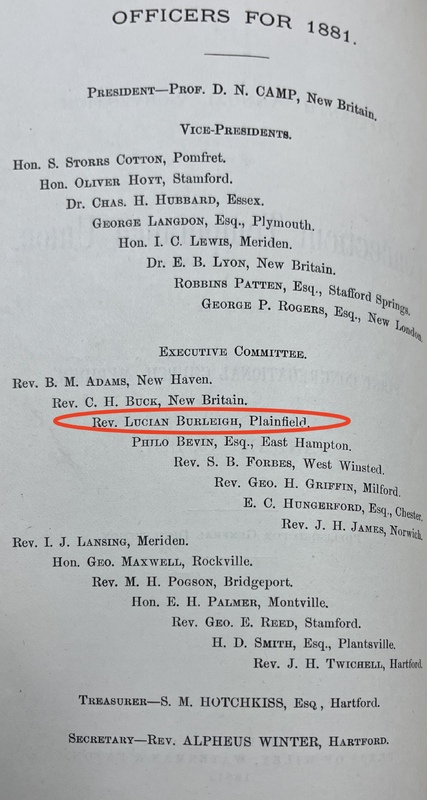
[Winter, Alpheus] Fifteenth Annual Report of the Connecticut Temperance Union, held in the First Congregational Church, Meriden, January 19th, 1881. Hartford: Wiley, Waterman & Eaton, 1881.
